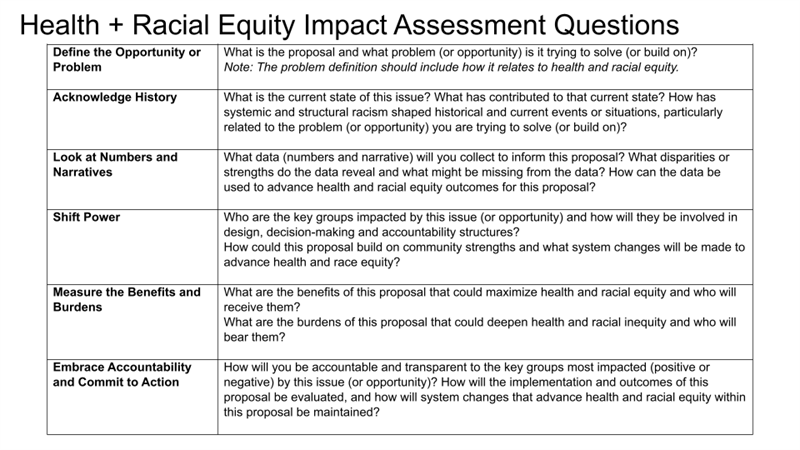In providing support to the City of Chicago on We Will Chicago, Metropolitan Planning Council has been working with the Chicago Department of Public Health and Illinois Public Health Institute on integrating health and racial equity impact assessment (HREIA) into the plan’s recommendations. We break down what an HREIA is, why we're using it, and how we're applying it to We Will Chicago.

Walter S. Mitchell III, Samuel Sotelo-Avila / City of Chicago
We Will Chicago transportation and infrastructure community meeting
In providing support to the City of Chicago on We Will Chicago, Metropolitan Planning Council has been working with the Chicago Department of Public Health and the Illinois Public Health Institute on integrating health and racial equity impact assessment into the plan’s recommendations.
Why consider health and racial equity?
The scope of the citywide plan includes issues that are essential to the everyday wellbeing and health of communities – transportation, education, housing, public safety, environment, arts, and economic development. In order to truly address past and ongoing inequities in these areas, and create policies that improve the city for everyone, it is essential to thoroughly consider what the potential benefits and unintended consequences of a policy might be. The two overarching principles of We Will Chicago are resilience and equity – using health and racial equity assessment tactics can help create recommendations that move the City toward those principles.
What is Health & Racial Equity Impact Assessment?
A Health Impact Assessment is a tool and process that can be used to understand and plan for potential health benefits and unintended consequences during a decision-making process. Health impact assessments can be used to evaluate any type of decision -- an ordinance, program, project, budget, etc. A Racial Equity Impact Assessment is a similar process and tool, focused on understanding the equity-related benefits and burdens that may result from a given decision.
In the course of a Health or Racial Equity Impact Assessment, a team pulls together information on the existing conditions of a community, asks questions about how and why those conditions exist, and considers what decision will maximize health or equity and minimize burdens for the community. In addition, assessments also make recommendations about how to implement the decision and track the outcome, providing some measure of accountability.
Given the close relationship between racial equity and community health, it makes sense to assess them together in a single process. The Chicago Department of Public Health, Illinois Public Health Institute, and a Community Accountability Committee had already begun working on a project to create a combined Health and Racial Equity Impact Assessment tool, which takes the best questions from both assessments. This chart shows the core questions that are part of Chicago’s combined Health and Racial Equity Impact Assessment.

Illinois Public Health Institute, 2022.
Health & Racial Equity Impact Assessment Questions
How are we using Health and Racial Equity Impact Assessment in We Will Chicago?
The Health and Racial Equity Impact Assessment team (MPC, the Chicago Department of Public Health, and Illinois Public Health Institute) have been able to provide guidance at a number of points throughout the We Will Chicago process, including:
- Providing input to the We Will Chicago team on overarching data and metrics related to health and wellbeing for the citywide plan.
- Creating unique introductory slides for each Pillar Research Team to understand the relationship between the topic area and health equity (for example: Arts & Culture and and health - slides 21-38; see meeting #4 notes for any topic).
- Providing the Health and Racial Equity Impact Assessment questions (above) and training the Research Team facilitators on how to use the core questions to consider health and racial equity while creating guiding questions and objectives.
- Creating activities and materials, such as a policy creation toolkit, to help research team members develop bold policy recommendations that explicitly name and consider racial and health equity outcomes.
What’s Next?
The HREIA team will continue to assist with the development of recommendations across all of the pillar areas, and do an overall review of the draft recommendations for alignment with racial and health equity. The team will continue to support the use of health and racial equity assessments throughout the implementation of We Will Chicago, translating policies to actions. The team is also participating in the Healthy Regions Planning Exchange led by the Regional Plan Association in New York City (funded by the Robert Wood Johnson Foundation) and is sharing lessons and strategies for equitable planning with our counterparts from other regions across the country.